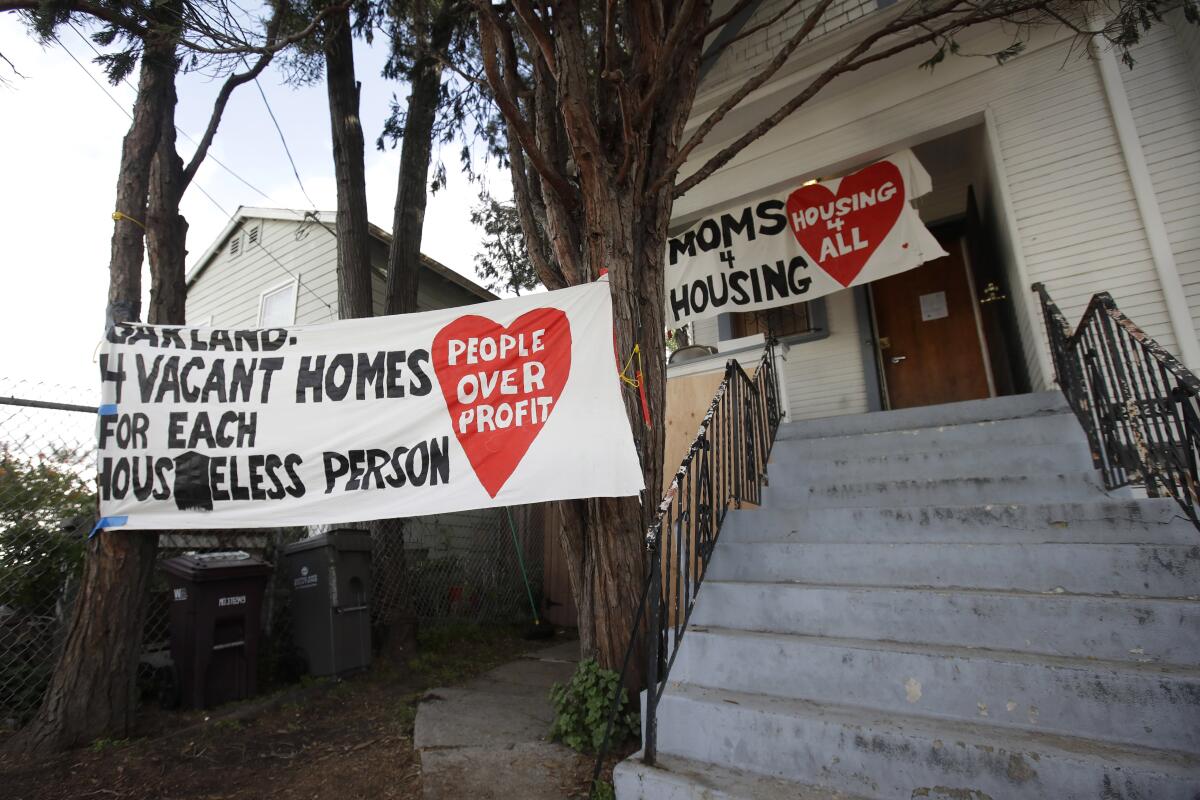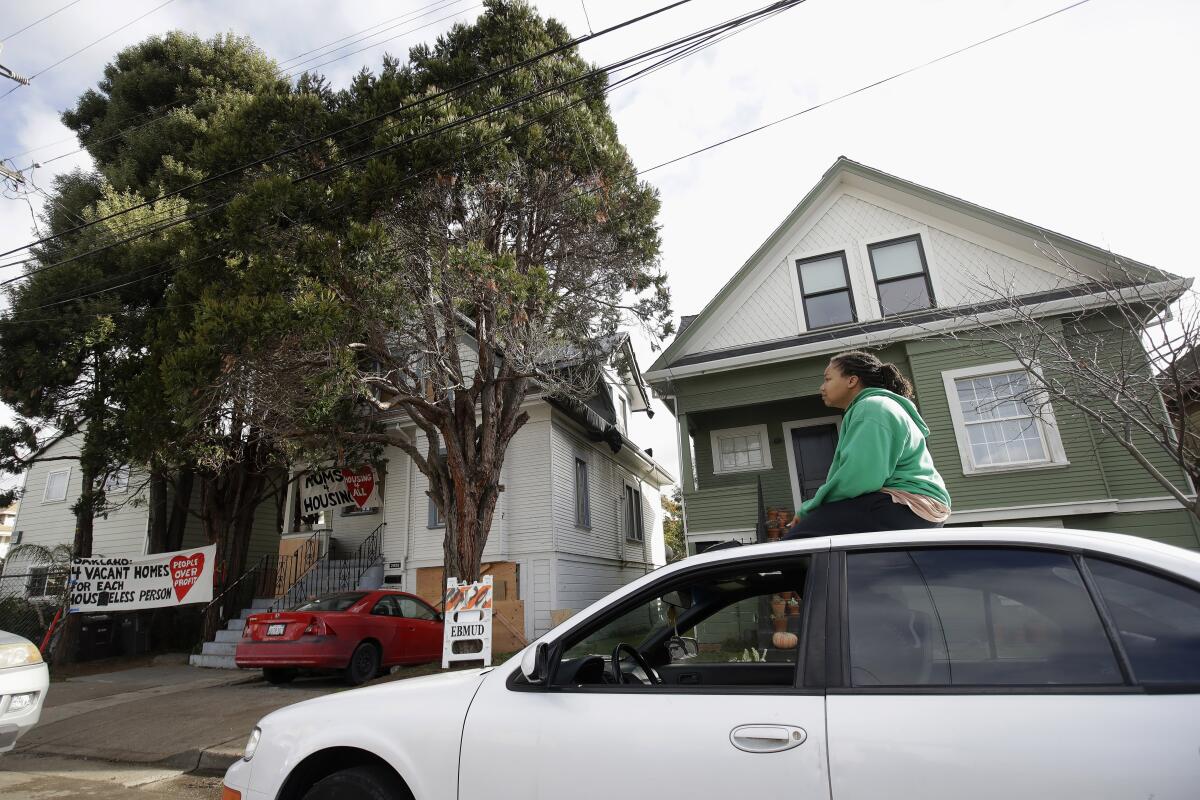Evicted Oakland moms will get their house back after a deal with Redondo Beach company

As the nation celebrated Martin Luther King Jr. Day, Oakland Mayor Libby Schaaf announced what she called a “historic deal,” which was (circle one): A) A win for civil disobedience. B) A big-hearted move by a Redondo Beach-based housing speculator. C) Skillful local leadership to address homelessness. D) All of the above.
Wedgewood Inc., which flips buildings in at least a dozen states, has agreed to sell one of its houses to a local trust on behalf of Moms 4 Housing, a group of homeless women who were arrested last week after taking over the empty three-bedroom with their children in an act of desperation and political protest.
Wedgewood will “offer community land trusts or other affordable housing organizations or the city the right of first refusal on all of their properties,” Schaaf said at a midday news conference. “This means we have the opportunity to — for fair market value — take these homes off the speculative market and put them into permanent ownership.”

Wedgewood owns about 50 properties in the city, company spokesman Sam Singer said.
Those new owners will be low-income families or affordable housing operators that will keep the properties accessible for Oakland’s most vulnerable residents, Schaaf said.
The home that will go to Moms 4 Housing is blue and white and sits on Magnolia Street in West Oakland. The company bought it at auction in July for $501,078, Singer said, and is in negotiations to sell it to the Oakland Community Land Trust for at least that price.
“We’re ready to buy the Moms house, and we’re ready to continue this movement,” Dominique Walker, one of the founders of Moms 4 Housing, told a happy crowd in front of Oakland City Hall on Monday. “This movement does not end today with us and with that house on Magnolia Street. We will not stop organizing and fighting until all unhoused folks who want shelter have shelter.”

The mothers squatted in the home for two months, until Alameda County sheriff’s deputies, their guns drawn, enforced an eviction order on Jan. 14. Two of the women and two male supporters were arrested.
The women of Moms 4 Housing were either homeless or on the brink of homelessness. They said the property had been vacant for years, which Wedgewood denies. But many investor-owned properties languish, uninhabitated, as gentrification and the housing crisis have become more acute in Oakland, causing widespread homelessness.
Between January 2017 and January 2019, the most recent statistics available, the number of homeless people in the Bay Area city rose 47%, according to Alameda County’s point-in-time count. The number of homeless people rose to 4,071 in 2019, up from 2761 in 2017. More than half of the county’s homeless people reside in Oakland.
In her news conference, Schaaf was coy about the broader ramifications of Moms 4 Housing’s actions — breaking into an empty house owned by someone else and living there without the owner’s consent. To the group, that’s appropriate protest. To Wedgewood, that’s theft.
“I cannot condone unlawful acts,” Schaaf said, “but I can respect them. And I can passionately advance the cause that inspired them. That’s what we are doing here today.”
In an interview as she headed to Washington for the U.S. Conference of Mayors, Schaff continued to walk a fine line. “It is not my intention to encourage civil disobedience,” she said, but “the mothers made a tremendous sacrifice for their cause. They spent the night in jail. They went through a horrific trauma with the eviction, which I believe was unnecessary on the part of the sheriff.”
Schaaf said that she spent two days trying to reach Wedgewood’s chief executive, Greg Geiser, after the eviction and arrests. She had spent considerable time negotiating with him since Thursday. Their first conversation lasted an hour and was “deeply personal,” she said.
The agreement with Wedgewood “is spectacular news,” Schaaf said, commending the company for being “willing to get past what was unlawful activity on one of their properties and make that property available to the very mothers who were in the property, and to recognize that we are in a housing crisis and companies like theirs can help.”
Geiser was not available for comment Monday. But Singer said that the company had made it known it would not discuss or negotiate over the house until the mothers left of their own free will or were evicted. Once the eviction occurred, Wedgewood officials began talking with Schaff and Gov. Gavin Newsom.
“You can never call it civil disobedience when it involves stealing someone’s property,” Singer said. “Wedgewood made it clear that it had the higher ethical and legal ground, and it prevailed. But that doesn’t stop it from doing what is good for the community.”
Singer said the company does not believe its agreement with Oakland to help assuage the housing crisis will encourage more squatters to take over uninhabited buildings.
Wedgewood “did not endorse or condone the theft of its home,” Singer said, “but expressed its support for the concerns raised by the activists. Today the company took action on it. They’re good to their word.”
More to Read
Sign up for Essential California
The most important California stories and recommendations in your inbox every morning.
You may occasionally receive promotional content from the Los Angeles Times.











